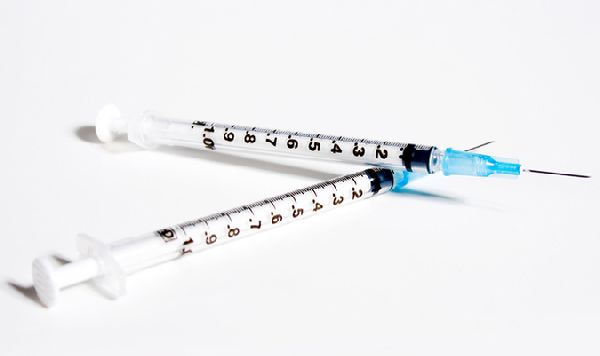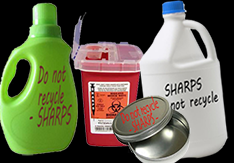Medical Waste
What is Medical Waste?
Medical waste is generated by hospitals, dental clinics, physician’s offices, medical laboratories, medical research facilities, and veterinary clinics as the result of treatments, immunizations, surgeries, diagnostic procedures, autopsies, or other medical procedures. Medical waste can also be generated through body modification shops such as where body piercing, tattoo, or permanent cosmetic coloring is practiced. In addition to these facilities, personal health care and veterinary care at home can generate medical waste.
Medical waste includes anything that is potentially pathogenic or infectious, i.e. could carry or transmit disease. Examples of medical waste include:
- Blood and other bodily fluids;
- Blood-soaked bandages, compresses, etc;
- Tissues, such as organs or biopsy samples;
- Used and unused hypodermic needles from the injection of insulin or other prescribed drugs;
- Tattoo and body piercing needles;
- Home kidney dialysis filter, bags, and equipment;
- Automatic lancets used for blood sampling;
- Contaminated gloves or other protective materials; or
- Culture materials and swabs.
Sharps
Syringes (needles) or lancets are medical waste known as “sharps”. They are a physical hazard as well as a disease hazard.
Never break the needle off a syringe and never try to recap it.
Do not drop your used syringes or lancets into regular trash.

Medical Waste Disposal Options
From Facilities or Commercial Entities
Hospitals, clinics, medical laboratories, veterinarians, home health providers, and body modification shops are responsible for properly treating and disposing of all medical waste. Medical waste from these facilities must be properly treated prior to disposal to prevent transmission of disease. Under state regulations, acceptable treatment processes are those that involve decontamination, incineration, or an autoclave. Each facility should have a procedure in place to ensure that medical waste is collected and treated prior to disposal. Facilities that do not have their own autoclave or incinerator should collect and ship medical waste to an appropriate treatment facility prior to disposal. Contact ADEC for a list of permitted treatment facilities in your area.
From Home Health Care
Medical waste can also be generated in the home by people who are collecting samples, treating a disease condition, recovering from surgery, or recuperating after an injury in their own home. This waste is potentially harmful and should not be thrown in the garbage like regular trash.
If you are managing diabetes, allergies, or another medical condition yourself or for someone in your home, contact your local pharmacy, medical service provider, health clinic, or hospital for disposal options. In most cases, your health care provider will accept home health waste and can treat and dispose of the waste for you. A second disposal option is to contact a local medical waste disposal company. They sometimes accept home medical waste at little or no charge. Mail back companies are a third disposal option. They typically provide the waste container, a box for mailing, and shipping costs. For a list of these companies, search online for "mail back medical waste" or similar search.
From Home Animal Care
Medical waste also includes any medication, instruments, or syringes from treating animals and pets for conditions such as diabetes, allergies, wound treatments, postoperative care, or even routine vaccines. Contact your veterinarian office to ask if they take back used sharps and medical waste for proper disposal from medications or treatments they have prescribed.
In-Home Disposal Options for Home Medical Waste

ADEC prefers that medical waste be disposed through medical service providers or medical waste disposal professionals. However, if you do not have access to one, there are steps you can take to safely dispose of it from home that will protect yourself and others, such as waste collection workers and landfill workers.
Place all sharps and potentially infectious waste in a puncture-resistant container with a sealing lid like a one-liter soda bottle, one gallon juice container, or plastic laundry detergent container. Clearly label the container as medical waste (example “sharps: do not open!”), seal tightly, and tape closed for added safety. The container will keep the waste away from others and protect against accidental punctures or cuts.
Additional Resources for Sharps Disposal
- Found a Syringe? How to Safely Dispose of Needles (Alaska Health and Social Services)
- Getting Rid of Used Needles, Syringes, and Lancets (University of Florida)

 Indicates an external site.
Indicates an external site.